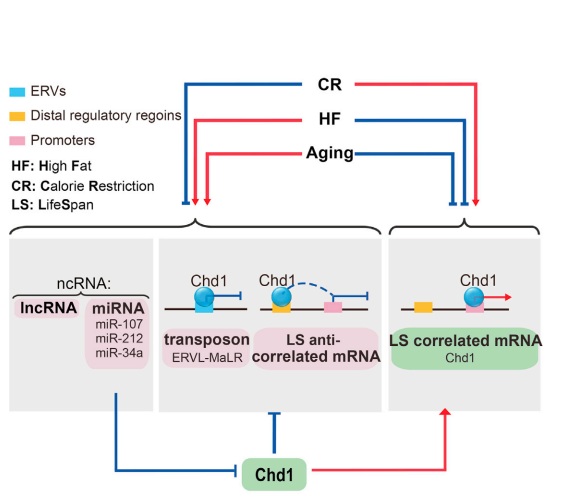Scientists Reveal Impact of Dietary Interventions on Noncoding RNAs and Transposons
Lifestyle interventions, such as modulating dietary macronutrients, caloric intake, and energy expenditure, can considerably affect the susceptibility to aging-related diseases and, in some cases, an organism’s lifespan. Calorie restriction without malnutrition and other interventions (e.g., voluntary exercise (Ex)) are known to reduce the occurrence of aging-related conditions, including obesity, type II diabetes, and cardiovascular diseases. CR, without a compensatory increase in food intake, consistently extends both mean and maximal lifespan in multiple species. However, little is known about the mechanisms regulating the transcriptional program for longevity across multiple interventions, especially at the epigenetic level.
Recently, a team of scientists led by Prof. Jing-Dong Jackie HAN and colleagues from CAS-MPG Partner Institute for Computational Biology (PICB), Shanghai Institutes for Biological Sciences, Chinese Academy of Sciences have gained important progress in exploring the mechanisms regulating ncRNAs and transposons expression by dietary restriction.
The researchers profiled liver microRNA (miRNA), coding and long non-coding RNA (lncRNA) expression by high-throughput deep sequencing in mice across multiple energy intake and expenditure interventions. They found that expression of miRNAs, lncRNAs, and transposable elements was largely repressed by lifespan extension interventions. The study also revealed that lifespan positively correlated protein-coding mRNAs are highly targeted by miRNAs and miRNA-targeting interactions mainly target chromatin-related functions. Furthermore, the researchers experimentally validated miR-34a, miR-107, and miR-212-3p targeting of the chromatin remodeler Chd1 and demonstrated the role of Chd1 in mimicking high fat diet and aging induced gene expression changes and activation of transposons.
These findings reveal that lifespan-extending interventions caused a dramatic global repression of transposons, and this repression safeguards chromatin from leaky transcription and deregulation of gene expression, at least in part, through novel miRNA-chromatin remodeler interactions.
This study entitled “Impact of Dietary Interventions on Noncoding RNA Networks and mRNAs Encoding Chromatin-Related Factors” was published in Cell Reports on March 21, 2017.
This work was supported by Ministry of Science and Technology of China, National Natural Science Foundation of China, Chinese Academy of Sciences, the Chinese Academy of Sciences Fellowship for Young International Scientists and SIBS Postdoctoral Research Grant.

Graphical Abstract: Through liver RNA sequencing and microRNA sequencing in mice across multiple energy intake and expenditure interventions, Green et al. found lifespan extending interventions largely repressed the expression of miRNAs, lncRNAs, and transposable elements; miRNAs preferentially target mRNAs whose expression positively correlated with lifespan and modulate expression by targeting genes with chromatin-related functions. (Image provided by Dr.Jing-Dong Jackie HAN’s lab, PICB)
Author Contact:
Jing-Dong Jackie HAN, PhD., Principal Investigator
CAS-MPG Partner Institute for Computational Biology, Shanghai Institutes for Biological Sciences, Chinese Academy of Sciences
320 Yueyang Road, Life Science Research Building Room 146,
Shanghai, China, 200031
Tel.: +86 13718590010
E-mail: jdhan@picb.ac.cn
(PICB)
